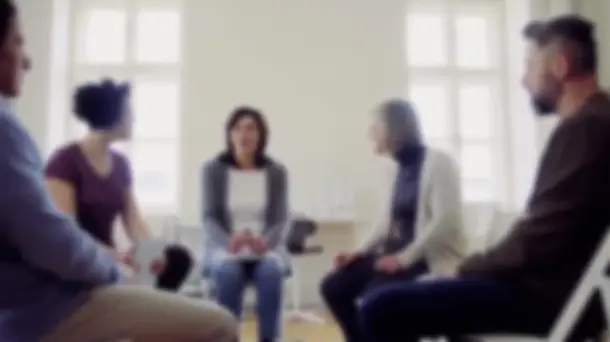Welcome to Narcotics Anonymous
What is our message? The message is that an addict, any addict, can stop using drugs, lose the desire to use, and find a new way to live. Our message is hope and the promise of freedom.

“When new members come to meetings, our sole interest is in their desire for freedom from active addiction and how we can be of help.”
It Works: How and Why, “Third Tradition”
Is NA for me?
This is a question every potential member must answer for themselves. Here are some recommended resources that may be helpful:
Need help for family or a friend?
NA meetings are run by and for addicts. If you're looking for help for a loved one, you can contact Narcotics Anonymous near you.
Subscribe to NAWS Emails
Sign up to receive Just for Today and SPAD daily meditation emails, as well as NAWS News, NAWS Updates, and more.
Never before have so many clean addicts, of their own choice and in free society, been able to meet where they please, to maintain their recovery in complete creative freedom.
Basic Text, “We Do Recover”
Recovery Quicklinks:
Service Quicklinks:
Narcotics Anonymous sprang from the Alcoholics Anonymous Program of the late 1940s, with meetings first emerging in the Los Angeles area of California, USA, in the early Fifties. The NA program started as a small US movement that has grown into one of the world's oldest and largest organizations of its type.
Today, Narcotics Anonymous is well established throughout much of the Americas, Western Europe, Australia, and New Zealand. Newly formed groups and NA communities are now scattered throughout the Indian subcontinent, Africa, East Asia, the Middle East, and Eastern Europe. Narcotics Anonymous books and information pamphlets are currently available in 49 languages.
Information About NA
Daily Meditations
Just for Today
January 29, 2026 |
The First Step–an action step |
| Page 29 |
| “Do we understand that we have no real control over drugs?“ |
| Basic Text, p. 18 |
| At first, many of us may have thought the First Step required no action–we just surrender and go on to Step Two. But Step One does require action! The action we take in the First Step will be evident in the way we live, even from our first day clean. If we truly believe that we are powerless over our addiction, we will not choose to be around drugs. To continue to live with or associate with practicing addicts may indicate a reservation in our program. An absolute belief that the First Step applies to us will insure that we clear our homes of all drugs and paraphernalia. As time goes on, we'll not only continue with the basics but add new actions to our First Step repertoire. We'll learn to feel our feelings rather than trying to control them. We'll stop trying to be our own and only guides on our recovery journey; self-sponsorship will cease. We'll begin looking to a Power greater than ourselves more and more for spiritual satisfaction rather than trying to fill that void with something else. Surrender is only the beginning. Once we surrender, we need to learn how to live in the peace we have found. |
| Just for Today: I will take all the action necessary to practice the First Step. I truly believe it applies to me. |
A Spiritual Principle a Day
January 29, 2026 |
Encouraging Growth |
| Page 29 |
| “We are inspired by one another's journeys. Being present to one another's growth gives us the tools and inspiration to move forward ourselves.“ |
| Living Clean, Chapter 2, “Connection to Others” |
| Starting from our first day clean, one of the most amazing gifts we find in NA is people who truly believe in us. Some of us are hesitant to believe in their belief, especially after disappointing so many people for so long. Still, there's something so genuine in the way members tell us, “You never have to use again, even if you want to,” and that encouragement can be all that it takes to get us to our next meeting clean. We change a lot in our first weeks, months, and years of recovery. “I laugh about it now, but they told me when I got clean not to make any major life changes during my first year,” one addict shared from the podium. “My entire life was turned around and flipped inside out–what could be more major than that?!” As time goes by, many of us settle into a more stable version of ourselves. A member with decades clean shared, “It's a reservation in my Second Step if I believe I can't still change just because I've been clean so long. If a newcomer can stop using drugs, I sure as hell can get help with a character defect.” Even though our early recovery often sees the most dramatic change in our lives, there is always room for improvement. “It is the most amazing gift to witness people in my recovery network grow,” one member wrote. “No matter how long I'm clean, seeing others change reminds me that I can, too.” Being present to others' growth means being present physically, showing up regularly. It also means truly listening to where our fellow members are at–mentally, emotionally, spiritually–and sharing honestly with them. The vulnerability, intimacy, and presence we practice in NA inspires growth in us all. |
| ——— ——— ——— ——— ——— |
| No change is too small or too big for my recovery. I will be present to the process and accept encouragement from other addicts. |
Do you need help with a drug problem?
“If you’re new to NA or planning to go to a Narcotics Anonymous meeting for the first time, it might be nice to know a little bit about what happens in our meetings. The information here is meant to give you an understanding of what we do when we come together to share recovery…”
Subscribe to NAWS Emails
Sign up to receive NAWS Updates and NAWS News emails as well as Just for Today and SPAD daily emails.



